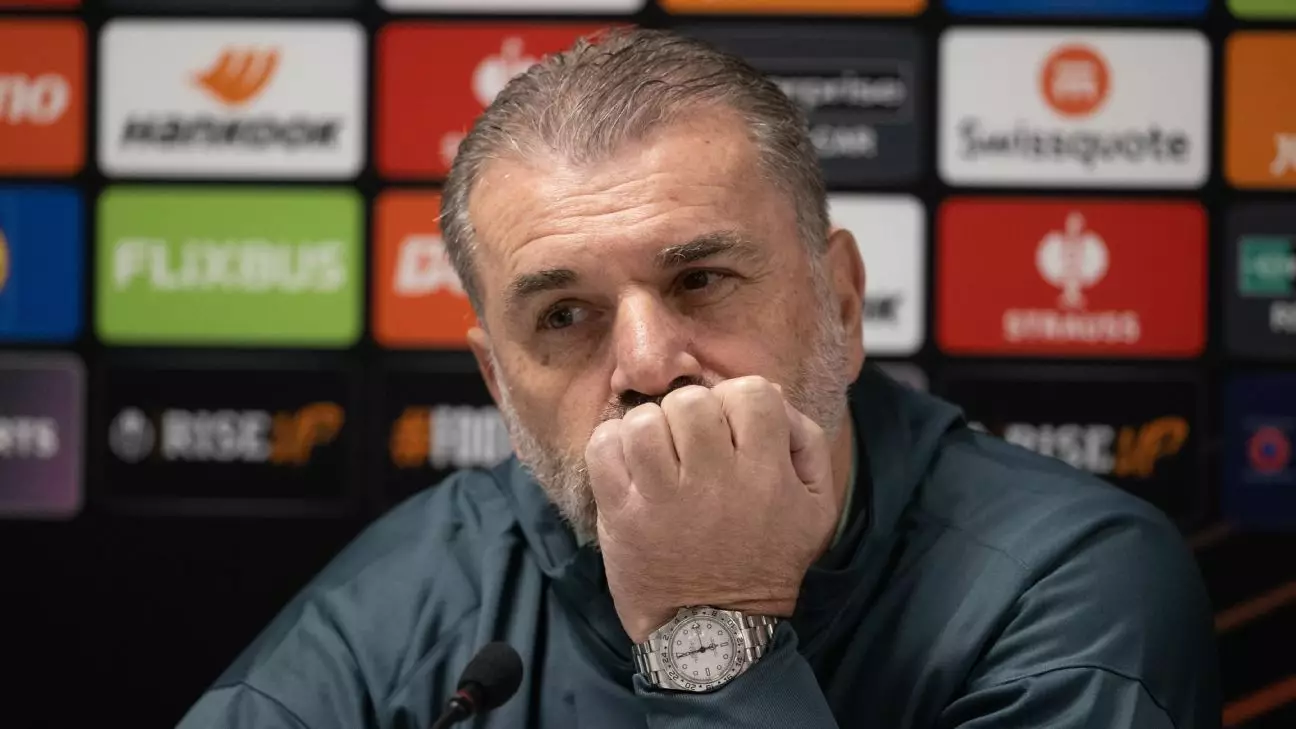Tottenham Hotspur, under the guidance of head coach Ange Postecoglou, finds itself navigating through an increasingly tumultuous period. Recent matches, notably the heart-wrenching 4-3 defeat against Chelsea, have intensified scrutiny over not just the players but the club’s overarching management strategies. Cristian Romero, defender and key player, inadvertently became a focal point of controversy with remarks that criticized the club hierarchy’s spending and lack of direction. This situation reveals not only the challenges Postecoglou faces but also provides a microcosm of a larger issue within the club, identifying the crucial need for unity and clarity as they push through a difficult season.
Romero’s candid remarks to Telemundo Deportes showcased a player’s frustration stemming from a perceived stagnation at Tottenham. By commenting on the lack of investment compared to rival clubs, he voiced concerns that many fans have lingering at the back of their minds. “It’s always the same—first the players, then the coaching staff changes,” remarked Romero, drawing attention to an apparent cycle of blame that has plagued Spurs in recent years. Such insights can be interpreted as a desperate call for introspection within the club, an appeal to recognize accountability in shaping the team’s fate.
However, the way in which he expressed these sentiments drew criticism not only from management but also raised eyebrows among fans and pundits alike. Postecoglou swiftly stepped in, emphasizing that while some of Romero’s points held merit, airing grievances publicly is rarely constructive. He stated, “We deal with these things in our own four walls.” This reinforces the notion that team cohesion and a unified front are paramount, especially in a landscape where external criticism can rapidly become overwhelming.
In light of Romero’s statements, Postecoglou exhibited a blend of empathy and pragmatism. He acknowledged the emotional weight behind Romero’s comments and the unfortunate timing of their delivery, suggesting that such sentiments are often best discussed within the inner sanctum of the squad. The coach’s response underscores an important tenet in management—recognizing the human element in sport while also maintaining a certain level of decorum.
Postecoglou’s experience as a coach in various high-stakes environments, including his success at Celtic, equips him with the tools necessary to address such crises. The seasoned coach highlighted the need for creativity in response to the mounting injury issues affecting key players—something that could hinder the team’s performance against Rangers in the Europa League. The looming absence of key defenders like Romero and Micky van de Ven means that Spurs may need to adapt their strategy, fostering a sense of resilience and flexibility in the squad.
The injury crisis at Tottenham has reached a level that Postecoglou describes as the worst he has ever faced as a manager. This reflects a broader trend in modern football where the physical demands on players are intensifying. As key players, including Romero, Van de Ven, and Ben Davies, grapple with injury, the likelihood of relying on less experienced players like 18-year-old Archie Gray intensifies. Such decisions force coaches to summon ingenuity that can lead to unexpected success, blessings in disguise, or further complications.
As Postecoglou prepares for Thursday’s encounter with Rangers, the pressure amplifies. It is a stark realization that Spurs, perhaps more than ever, must demonstrate not only Manchester-level resolve but also adaptability against a team keen to capitalize on their current struggles. This clash pits not just tactical acumen against one another but also situational leadership—how well can a coach manage adversity, both in-game and off the field?
As Tottenham Hotspur trudges through this complex blend of internal and external challenges, the importance of strong leadership and open communication cannot be overstated. The incident with Romero serves as a clarion call for the need for introspection and the importance of unity within the club. For Postecoglou, the upcoming match against Rangers will be a defining moment—not just in terms of results but as a reflection of his management style and ability to inspire cohesion in turbulent times.
Ultimately, Spurs stand at a crossroads; while the prospect of a bright future lingers in the air, the immediate challenges pose significant hurdles. How the club navigates these waters will not only determine their standing this season but could also set the tone for a long-overdue renaissance at White Hart Lane.

